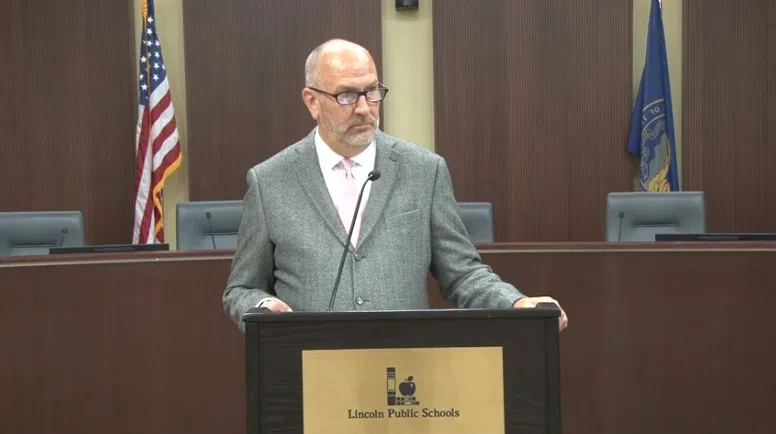National political discourse surrounding transgender youth participation in school sports, designations for trans-student restrooms/locker rooms, and so-called “obscene materials” in school libraries, trickled down to Nebraska’s Unicameral legislature this year.
State lawmakers took up and ardently debated a couple bills in 2024 that sought to address and regulate these subjects.
LB 441, a bill allowing for prosecution of K-12 school officials or librarians if they provide obscene materials to minors — effectively incentivizing institutions to ban any objectionable materials — failed to advance after one lawmaker inserted the name of a fellow senator into a graphic reading depicting sexual assault. Emotional exchanges and calls for censure/resignation likely contributed to lawmakers passing on the bill, and that lawmaker, Sen. Steve Halloran of Hastings, was later “reprimanded” for his comments.
The “Sports and Spaces Act” (LB 575) was similarly the subject of charged debate among lawmakers. The bill, compelling schools to define and separate school bathrooms and sport teams based on sex at birth — effectively prohibiting transgender youth from participating in sport teams/utilizing bathrooms for their preferred gender — also failed to advance, by a narrow margin of two votes.
Producing many local/national headlines and public conversation, Lincoln Public Schools Superintendent Dr. Paul Gausman contributed by addressing the district’s policy approach to these issues on KLIN’s Drive Time Nebraska with host Doug Fitzgerald.
In regards to transgender student sports participation/bathroom usage, Gausman said LPS adheres to different sets of preexisting policies.
LPS is a member of the Nebraska State Activities Association (NSAA), which governs school athletic programs and competitions, and has instituted rules on transgender youth participation in athletics.
“As part of being a member, we agree to be governed by that process,” explained Gausman. “Once a student is eligible to participate — meaning after it’s been reviewed and approved by the Gender Identity Eligibility Committee of NSAA, an LPS student assistance team, is then created to work through the process. That team consists of the student participant, the parents and guardians, the coach sponsors, the school counselor, school administrator, of course the athletics and activities administrator, the LPS student services administrator, and LPS youth development representatives… we work through each family, each situation, on a one on one basis.”
Gausman added, addressing a supposed concern, that he’s “not aware of a single situation” at an LPS school, in which a student athlete was injured while competing against a transgender student.
“It is a very rigorous process and a very challenging process that these families are going… and we support them and want to do everything that we can for them because our goal is their success, which, frankly, is our community success when that occurs,” he said.
Looking specifically at restroom/locker room policy for transgender youth, Gausman said the practice of addressing situations on a “case-by-case” basis is the same, but is determined by the Lincoln School Board.
“We’ve actually had guidelines and policies on this subject for many, many years,” Gausman said. “We work with students on an individual basis. I don’t know that people are aware of this, but we have an awful lot of restrooms in the district that are unisex and single stall. We have a process that we go through where any child is more than welcome…to have the privacy of that single bathroom.”
Gausman opined, statewide legislation may not be the best way to address the complexities of these topics.
“Every time we try to write a law… we have to understand that every family has their perspective on what’s best for their child, and that’s what we’re about, serving them as best as we can within those needs,” the Superintendent told Fitzgerald.
Addressing another supposed concern, Gausman detailed how stringent these policies are.
“Were you to ask me if somebody could just show up at school tomorrow and say, ‘hey, I’m going to start using a different restroom.’ The answer is no.
You can’t just do that and switch back the next day…. if it was a single restroom, maybe tomorrow you could start using that. But, if we’re talking about gender specific restrooms, we have a process that we go through, and we do it with each,” he specified, adding that these situations are “not as prevalent as the community might believe it to be.”
Moving to the subject of obscene materials in schools libraries, Gausman addressed the notion that pornographic-like books and materials are available for student consumption.
I want to be very clear… We do not offer pornography in our school libraries. We don’t have students who come to the library or use databases to find pornographic materials,” he said conclusively. “Students may seek to broaden their understanding through fictional lives of characters as imperfect or
flawed or damaged as they might be in that story… But we are not about that explicit nature… for the sake of being explicit.”
The line between young adult content and adult content, is fine, said Gausman, adding that school library professionals are trained to course through these topics and determine what would be appropriate are merited for student consumption.
“Our libraries have a lot of perspectives. Not every student, not every family member or citizen will agree with all of the perspectives. But we couldn’t open the libraries and say, ‘come in and read everything, and anything you don’t like, just throw it out.’ Because we likely wouldn’t have much left,” he said.
Gausman did make clear, on the other hand, that parents can request for any specific piece of material can be restricted from their own child, “and that will happen in every case.”
However, “A parent isn’t able to request that some other child, that’s not their responsibility, have limitations placed on them. With the caveat that
we have a process where anyone in our community can request a review of material in school libraries,” Gausman made clear.
Gausman concluded by saying, much superintendent work is similar to “snow days.”
“Should we have school or shouldn’t we? Well, the town is 50/50, right? You can’t write a policy that can cover every weather event… You can’t write a policy that covers every single thing,” he said. “We have to put experts in place. We have to listen to the perspectives of our parents. I want to serve the parents and guardians of the students that we serve.”







